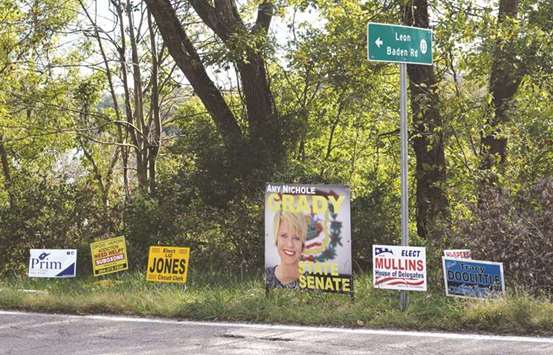Like thousands of fellow teachers across West Virginia, Amy Grady went on strike this year demanding better healthcare and higher pay. Now she hopes to give state legislators a lesson by capturing a state Senate seat.
With labour activism catching fire and spreading to multiple US states, a record number of teachers — 1,455 current and former educators, according to the National Education Association — are running for office in today’s midterm elections.
Most of them are Democrats aiming to make the leap from schoolhouse to statehouse, to shake up American politics and to make education a priority for the election and beyond.
“I didn’t foresee myself running for this,” Grady told AFP in her classroom at Leon Elementary School, as her students focused on assignments at their desks.
The 39-year-old was among 20,000 angry West Virginia teachers who launched a nine-day wildcat strike in February that became the most potent display of US educator activism in decades.
It set off similar walkouts and protests in Arizona, Colorado, Kentucky, North Carolina and Oklahoma, temporarily shuttering thousands of schools and sending shockwaves through legislatures and President Donald Trump’s administration.
“The more I talked to teachers and service personnel and different people, they were saying, ‘We need somebody who can represent us, somebody who understands what we’re going through, somebody who has been in the school system,’” said Grady, who has taught in Leon for nine years and is running for office as an independent. “I decided to go for it.”
So did Brianne Solomon, an art and dance teacher at Hannan High School in Ashton now running as a Democrat for the House of Delegates.
Solomon resented the way the state was steadily chipping away at public school funding, even as teachers took on added responsibilities to help students with family problems, including the opioid crisis devastating West Virginia communities.
“I’m kind of fed up,” Solomon said last week during her campaign fundraiser at a Charlotte bar. “I’m not a career politician, but I’m going to put my name on the ballot.”
The NEA expects the spirited teachers’ movement to translate to wins in statehouses in Trump country, the so-called red states.
“We are going to ride this #RedForEdWave straight to the ballot box in November,” NEA president Lily Eskelsen Garcia said last month.
More than 20 educators are also running for seats in Congress, including 2016’s National Teacher of the Year, Jahana Hayes of Connecticut.
Inspired by their West Virginia comrades, thousands of teachers in deeply conservative Oklahoma picketed in April, demanding higher pay and more school funding.
Trent Ratterree, a former college athlete and now a political organiser for the Oklahoma Education Association, said the teachers’ passion “blew me away.”
“I’ve played football in front of 100,000 people, and the energy inside the State Capitol — this walkout was one of the most impressive and best things I’ve ever been a part of,” Ratterree said.
More than 60 Oklahoma educators are on this year’s ballot, including Jennifer Esau, who is running for state Senate.
“It’s been a long time coming for Oklahoma, and when we saw West Virginia do it, we thought, okay, this is our moment too,” Esau, 44, told AFP by telephone.
Teachers, she noted, are exposed to the gamut of community experience: budgeting, poverty issues, foster care, incarceration and the ravages of the opioid epidemic.
“That makes us better able to serve and to help our constituents because we’re living it,” said Esau, who expressed frustration that her Republican rival is “not interested” in boosting education funding.
Republicans insist education is their priority too. Daniel Linville, a Republican in West Virginia’s House of Delegates, said it was Democrats, who controlled the legislature for decades, who let teacher pay slide, from 30th out of 50 states nationwide in 1992 to 49th in 2015.
Democrats argue that it was their persistence that led to pay raises this year, but Republicans want credit too.
“The reality is, it would have been impossible for that to have happened if Republicans didn’t step up as well,” Linville said.
After the 2008 economic crisis, most US states cut funding for public education. Teacher Vera Miller, a Republican candidate for West Virginia’s House of Delegates, aims to reverse that. “I’m a big supporter of public education. That is the true basis of the American dream,” she said in Huntington.
Back in Charleston, Solomon said Republicans were dragged kicking and screaming into improving teacher healthcare and pay.
“You don’t cut the people who carry this state on their backs,” she told supporters at her fundraiser. “Hopefully, when I’m elected — I like to say that — you’re going to have a seat at the table.”

Campaign posters put up outside Leon, West Virginia.
